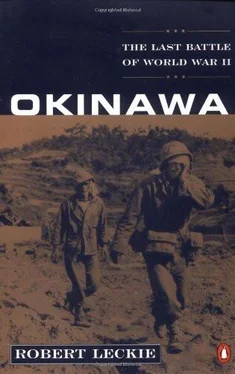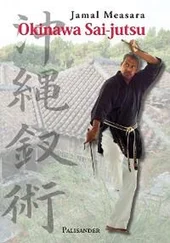Marines toiled up hills with five-gallon cans of water on their backs and bandoleers of rifle-clips or grenades slung crisscross about their bodies. Battalion commanders going up to inspect the lines brought a water can or a mortar shell along with them.
It was four days before the Marines burst into Colonel Udo’s headquarters to discover this mimeographed sheet intended for their eyes:
NEWS OF NEWS
No. 1
Saturday, April 14
President Roosevelt Died A Sudden Death
To the men of the Sixth Marine Division!
We take it a great honor to speak to you for the first time.
We are awfully sorry to learn from the U.P. telegraph that the life of President Roosevelt has suddenly come to its end at 3:30 P.M. on April 12. It seems to be an incredible story in spite of its actual evidence.
Men of the 6th Marine Division, particularly men of the 15th and 29th Marines and the 3rd Amphibious Corps, we express our hearty regret with you all over the death of the late President. What do you think was the true cause of the late President’s death? A miserable defeat experienced by the U.S. forces in the sea around the island of Okinawa! Were this not the direct cause leading him to death, we could be quite relieved.
We do not think that the majority of you have exact knowledge of the present operations being carried out by the U.S. forces although a very few member of you must have got a glympse of the accurate situation.
An exceedingly great number of picked aircrafts carriers, battleships, cruisers and destroyers held on her course to and near the sea of Okinawa in order to protect you and carry out operations in concert with you. The 90% of them have already been sunk and destroyed by Japanese Special Fighting Bodies, sea and air. In this way a grand “U.S. Sea Bottom Fleet” numbering 500 has been brought into existence around this little island.
Once you have seen a “Lizard” twitching about with its tail cut off, we suppose this state of lizard is likened to you. Even a drop of blood can be never expected from its own heart. As a result an apopletic stroke comes to attack.
It is a sort of vice however to presure upon others unhappiness. This is why we want to write nothing further.
It is time now for you, sagacious and pradent, however, to look over the whole situations of the present war and try to catch a chance for reflection!!
The Marines went on to conquer the rest of Motobu, securing the peninsula on April 20. Above them, the Sixth Division’s Twenty-second Regiment had reached Okinawa’s northernmost point. The biggest battle in the northern sector was over.
The Sixth spent the rest of April patrolling and pursuing those Japanese who had fled Yaetake and turned irregular, using wardogs to scent the enemy and bark a warning. They even found that natural enemy of whom they had had such ample, ominous warning.
“Lookit the snake I just killed. It’s one of them habu!”
“Hoo-what?”
“Habu, the snake they was all talkin’ about before we landed.”
“What’re yuh gonna do with it?”
“Do with it! With the slop they been feeding us on this screwy island? I’m gonna cut it into fillets and then I’m gonna fry it and eat it!”
Marines of the First Division were not quite so desperate. They were, in fact, still celebrating the honeymoon, extending it for the duration of the month of April.
Many of the division’s battalions built bivouacs complete with gravel paths, showers, and mess halls. The men went to abandoned Okinawan homes to remove the sliding panels that separated the rooms. They used them for foxhole covers or to build shanties. Everybody had a pet—a pony, a goat, even one of those numerous Okinawan rabbits that might have escaped the pot. There was an open-air theater at Division Headquarters, and there all the clerks and typists gathered nightly to play leapfrog until it was dark enough for a movie. This was not battle as the First had known it. But the men said, “Peace—it’s wonderful!” They were so enchanted by “Lilac Time” that they brewed jungle juice out of their rations, drank it from “borrowed” lacquerware—one of Okinawa’s few crafts—and began to harmonize.
They sang all the old favorites such as “The Wabash Cannonball” or “Birmingham Jail,” as well as that vast repertoire of bawdies and unprintables collected or composed by local bards during three years of tramping the Pacific. There was a new printable one for Okinawa, and it went:
Oh, don’t you worry, Mother, your son is safe out here.
No Japs on Okinawa, no sake, booze or beer.
Your sons can’t find no Nips, so we’re going back on ships.
But don’t you worry, Mother, cause we’re going on another.
But they were not. The honeymoon was ending. They were staying on Okinawa and going south, down to that Naha-Shuri-Yonabaru line that had stopped the Army’s Twenty-fourth Corps.
In the meantime, Admiral Ugaki had hurled the first of his kikusui —or “Floating Chrysanthemums”—aerial strikes on the American warships surrounding Okinawa; while Admiral Soemu Toyoda, Navy Chief of Staff, had also ordered great Yamato —the mightiest warship ever built—to join these kamikaze attacks as a suicide battleship.
“Floating Chrysanthemums”
CHAPTER TEN
In Japan the chrysanthemum is probably the most beloved of all flowers, woven into wreaths for weddings and funerals alike, decorating graves or dropped by grieving pilots onto waters in which their dearest comrades had plunged to their death. Thus, in conformance with this custom among the flower-loving Nipponese, Admiral Matome Ugaki decided to give the scheduled Ten-Go aerial attacks on American shipping the name of kikusui, or “Floating Chrysanthemums.”
Although Ugaki’s aerial strength on Kyushu had been seriously weakened by Halsey’s strikes of mid-October 1944, and especially by Spruance’s sweeps of March 18-19, 1945, he still had well over three thousand planes—both conventional and suiciders—in his command after the Americans landed on Okinawa.
Ugaki had few reservations about his ability to shatter the enemy fleet and so delay or even prevent the invasion of Japan proper, but he did occasionally despair about the absence of coordination and cooperation among the Army and Navy subordinate air commanders on both Formosa and Kyushu. Though the Japanese command structure was probably better unified for Okinawa than for any other operation thus far, it was still a most casual chain of command in which the last thing a subordinate commander in, say, the Army, would think of doing was to obey an order from a superior in the Navy. At best to them an order was no better than a suggestion. Thus Army and Navy commanders on those two great island fortresses neither Cooperated with each other nor followed directives from the Combined Fleet or Imperial Army Headquarters in Tokyo. Although there was indeed intense and divisive rivalry between the American Army and Navy in the Pacific, orders from superiors were never—or at least seldom—ignored. If Fleet Admiral Nimitz issued orders to Admiral Turner off Okinawa, he transmitted them to General Buckner, who obeyed them without question.
Admiral Ugaki enjoyed no such luxury. If he wanted Lieutenant General Michio Sugahara, commander of the Sixth Air Army on Kyushu, to take some action, he would not issue an order but rather send a diplomatic officer to Sugahara’s headquarters to explain in the least offensive language what was being required of him. Such deference, of course, did not forge the Japanese chain of command with iron links, and it also wasted valuable time, for Ugaki was based at Kanoya and Sugahara at Chiran. Nor could he ask Admiral Toyoda’s fleet to issue an order binding on both of them. All that Ugaki could do was to send orders to a pair of Army air divisions that made most of the Okinawa attacks, although even here they were sometimes ignored. It is possible that this deference by senior officers to their subordinates was the result of Japanese misunderstanding of the character of Western military officers. When Japan decided to build the Imperial Navy, the model was the British Royal Navy, and the innate courtesy of its officers was mistaken for reticence. Thus an admiral might hesitate to insist that a commander give unbending obedience to his orders lest it be considered rude.
Читать дальше










